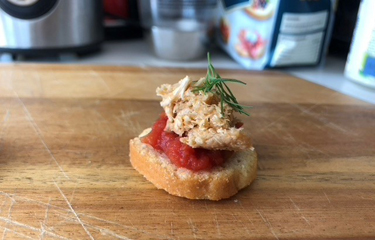Plant-based seafood analog products are becoming increasingly popular, and, while many are still in the development stage, cellular-based seafood options are also on the rise.
In the most recent notable example of plant-based seafood success, Stockholm, Sweden-based Hooked Foods is launching Toona, shredded plant-based tuna, in restaurants nationwide next spring. The shredded Toona can be used in a wide range of dishes, including sushi, pizza, pasta, and sandwiches, the company said.
Hooked raised SEK 5.14 million (USD 621,000, EUR 507,000) in capital to fund the expansion, thanks to new investors such as Katapult Ocean, Wave Ventures, PlusCap, ProVeg, and Veg Capital.
“The goal is to get as many people as possible to switch to plant-based alternatives to fish, without compromising on taste, quality, and nutrition,” Hooked said in a press release.
The company is initially launching Toona in restaurants versus retailers because “the chefs in the restaurants are experts on creating delicious dishes and can hence serve our products in a tasty and attractive way to the consumers,” Hooked Co-Founder Emil Wasteson told SeafoodSource. “If we sold it directly to consumers, they might not know how to use it in the best way.”
Wasteson and fellow co-founder Tom Johansson formed Hooked after “we found so many issues linked to a growing demand for seafood, and realized how little we knew about fishing and aquaculture,” Wasteson previously told SeafoodSource. “They included sustainability, carbon footprint, feed, use of antibiotics, bycatch, escapes, heavy metals, and microplastics, to name just a few.”
Similarly, Gathered Foods, maker of the Good Catch plant-based seafood analog brand, is expanding its products to several European markets.
In the Netherlands, Good Catch's plant-based products are now available in more than 70 stores, including Albert Heijn, Jumbo, and Coop. Good Catch is also now available in specialty supermarket chain Sanchez Romero in Madrid, Spain.
"Gathered Foods has plans to continue its expansion in these key European markets and more into 2021 through various distribution channels, including restaurant partners,” the company said.
Meanwhile, Asian-based cellular technology companies are in the research and development phase of producing seafood products that will achieve commercial production in the next year or more.
Hong Kong, China-based Avant Meats, for example, is focusing on the Chinese market with its cell-based fish fillets.
Avant will soft-launch one of its products in the first quarter, co-founder and CEO Carrie Chan told SeafoodSource, while declining to reveal further details on the product.
The company plans to achieve pilot production by the end of 2021 or early 2022, “when we will be able to produce a small volume for commercial products,” Chan said.
Avant is targeting both foodservice and consumer product companies for its cell-based fish.
Singapore-based Shiok Meats is focusing on developing cell-based crustaceans, and recently unveiled the world’s first cell-based lobster meat.
Shiok first launched its shrimp prototype in March 2019 in the form of Chinese steamed dumplings. It is planning to launch a minced shrimp product in 2022, and eventually plans to launch shrimp flavoring paste and powder, fully-formed 3D shrimp, and cell-based lobster and crab products.
Cell-based proteins of all types are expected to benefit from Singapore Food Agency’s recent approval of Eat Just’s cell-cultured chicken. The agency is the first in the world to grant approval to meat created in a lab.
The plant-based meat industry is currently valued at more than USD 900 million (EUR 736 million), and saw an 18-percent increase in sales last year, according to a GlobalData report. Plant-based tuna, salmon, caviar, scallops, squid, crab, and shrimp have already entered the market, with the most common ingredients listed as soy, seaweed, yeast, legumes, and various vegetable oils and starches, Forbes recently reported.
While the plant-based sector’s innovation in producing fake seafood has happened at a slower pace than its incursion into the meat and dairy sectors, it is poised to take off, GlobalData consumer analyst Yamina Tsalamlal told Vegconomist.
“Unlike plant-based burgers, seafood has been quite challenging to replicate and has seen a slower pace in terms of innovations,” Tsalamlal said. “But the seafood industry continues to grow – per capita consumption of seafood increased by 10 percent between 2015 and 2019.”
A full list of all plant-based seafood and cellular aquaculture companies operating globally was recently published by Erik Byrenius, the co-founder of foodtech investment firm Trellis Road.
Photo courtesy of Hooked







